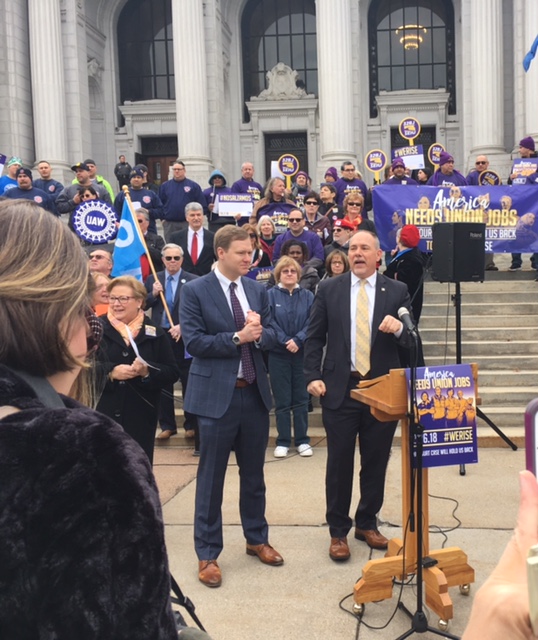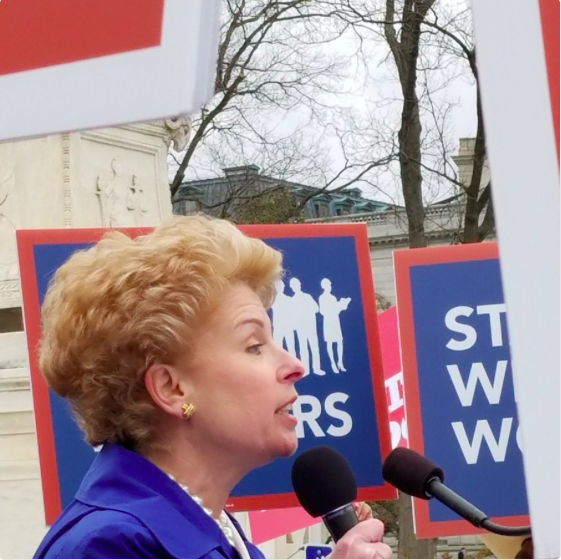Approximately 150 protesters gathered outside the Connecticut Supreme Court across from the Capitol on Monday to protest Janus v. AFSCME, a free speech case being heard by the U.S. Supreme Court.
Organized by the CT Working Families Party and Connecticut’s government employee unions, the rally was joined by Speaker of the House and AFSCME employee Joe Aresimowicz, D-Berlin, House Majority Leader, Matthew Ritter, D-Hartford, Rep. Mike D’Agostino, D-Hamden, and Rep. Matt Lesser, D-Middletown.

Janus v. AFSCME will determine whether public-sector workers can be forced to pay agency fees to a union. The ruling could affect more than 5 million government employees in 22 states, including Connecticut.
Plaintiff Mark Janus, a public sector employee from Illinois, is arguing that government unions are “inherently political” and that being forced to contribute money to the union is a violation of his free speech rights. A ruling in favor of Janus will have no impact on trade unions in the private sector.
Current law in Illinois and Connecticut allows a government employee who does not want their dues being used for political purposes to become an “agency fee payer.”
The agency fee payer must continue to pay a fee to the union for collective bargaining representation. The agency fee generally ranges from 10 to 20 percent less than normal union dues.
Janus argues that because collective bargaining tells governments how much they must spend on salaries and benefits, as well as how government programs are run, it is inherently political. Therefore union political spending cannot be separated out from the bargaining fees.
“When anyone else does that, everyone recognizes it as political speech, and we call it lobbying,” says Jacob Huebert, director of litigation at the Liberty Justice Center and the attorney representing Mark Janus. “So when a worker is forced to give money to a public-sector union to pay for collective bargaining, he or she is being made to pay for someone elseʼs political speech – something the First Amendment virtually never allows.”
Union leaders, on the other hand, worry that workers will leave unions if given a choice, thereby draining money from the unions’ political coffers and weakening their ability to collectively bargain.
Union leaders’ concerns about the loss of membership may be well founded. According to a 2016 survey of union households, 28 percent of union members would opt out of their union if given the chance and 66 percent said members should have a choice in whether or not to be represented by a union.
Larry Lunden, a Connecticut retiree and member of CSEA SEIU, worries that when given a choice, some state government employees will opt out of a union. “I think some will depending on their feelings about the unions,” Lunden said. “But as new employees come in they may not be inclined to join. I think that’s a vulnerability.”
Speaking before the crowd, President of the Connecticut chapter of AFL-CIO Lori Pelletier said the Janus case is an attack on working people by corporate America.
“We are going to take this fight, take it to the streets, whether its in Hartford or New Haven, Stamford or at UConn today,” Pelletier said. “We’re going to make sure that the people across the street here and the people all across Connecticut understand we will not sit idly by while corporate America tries to beat us down.”
The Janus case would only affect public-sector workers. Unions representing workers in the private sector will not be affected if the court sides with Janus.
But government remains one of the last bastions of union power in the United States. Union membership in most employment sectors is down except for state government. In Connecticut, 60 percent of all union members work for either the state or local government.
But some Connecticut government employees who would opt out may have good reason to do so, according to Yankee Institute President Carol Platt Liebau.
Speaking at a rally on the steps of the U.S. Supreme Court in Washington D.C. today, Liebau said that Connecticut’s government workers have been poorly served by their union leaders.
“For years, their leaders made agreements with state lawmakers to underfund our state pension system and they left it in tatters,” Liebau said. “Even though — as one of those union leaders admitted — they knew it wasn’t a good idea.”

Those unfunded pension costs now threaten the ability of Connecticut to function without raising taxes or cutting education funding to towns and cities.
The pension crisis not only threatens to raise the cost of living in Connecticut, but will likely result in less job security for union members in the future as Connecticut tries to deal with multi-billion dollar deficits.
Union leaders, however, have continually pushed for lawmakers to raise taxes to meet those growing costs.
Pelletier blamed the Citizens United Supreme Court decision for allowing money in politics and preventing President Barack Obama’s supreme court nominee from being appointed. “This is what Citizens United brought us,” Pelletier said. “Make no mistake, that is what it was about.”
Unions like AFSCME are some of the largest donors to political campaigns and causes. In 2016, AFSME spent $15.6 million on contributions toward Democratic candidates and campaigns, along with lobbying for political causes.
The AFL-CIO spent $19 million on political campaigns and lobbying in 2016 and SEIU spent $39 million. Both organizations contributed almost entirely to Democrats or used the funds to campaign against Republicans.
In Connecticut, unions also contribute heavily to state political campaigns through political action committees and by funding organizations like the Working Families Party, who occasionally run primaries against Democratic incumbents they feel are not supportive of their goals.
The WFP and state government union leaders have already indicated they will try to force out three Democratic senators who voted against the Democrats’ budget bill in September.
A similar case — Friedrichs v. the California Teachers’ Association — was heard before the U.S. Supreme Court in 2016 and resulted in a tie due to the death of Supreme Court Justice Antonin Scalia.
A decision the Supreme Court on the Janus case is expected in June.


cara menang adu balak
June 15, 2018 @ 8:08 am
I believe you have remarked some very interesting points, thank you for the post.